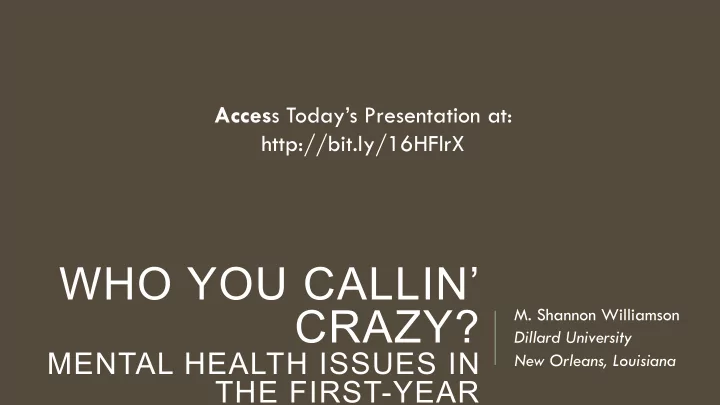

Acces s Today’s Presentation at: http://bit.ly/16HFlrX WHO YOU CALLIN’ CRAZY? M. Shannon Williamson Dillard University MENTAL HEALTH ISSUES IN New Orleans, Louisiana THE FIRST-YEAR
OBJECTIVES ~ Understand the increasing mental health issues on our campuses ~ Identify key players that need to be included in the conversation about mental health resources on their campus ~Plan a mental health awareness program for a specific population or group.
WHO’S HERE? TABLE SHARE Name Institution Your role on campus The mental health issue that is most concerning you on campus right now Time Limit: 30 seconds per person (5minutes total)
THE CRAZY TRIFECTA Adjustment Financial Stress Social Pressure Policy Issues Age of Newly Onset Independent
Someone has to connect the dots?
START THE CONVERSATION TABLE SHARE What positions or offices are involved in the conversation about mental health on your campus? Who else needs to get involved? Time Limit: 6 minutes
PROGRAMMING TABLE SHARE Bulletin Board At your tables, spend 10 minutes planning a program for first-year Residence Life students (or faculty who teach first-year students. Be sure to include: Counseling Center Outreach ~ Learning Outcome FYE Office ~ Resources (materials and people) Faculty Training Session ~When and Where Awareness Program ~Something fun!
BULLETIN BOARDS
RESIDENTIAL LIFE Sweet Home New Orleans
OUTREACH PROGRAMS FOR STUDENTS Popcorn and Possibilities Sodas and Solutions
FYE OFFICE PROGRAM
FACULTY PROGRAMING Gear Faculty Workshops/Meeting Announcements
AWARENESS PROGRAMING
Contact me at: THANK YOU! mwilliamson@dillard.edu @mshannonw
SOURCES American Psychological Association,. (2013). College students’ mental health is a growing concern, survey finds . Vol 44, No 6, Page 13. or http://www.apa.org/ monitor/2013/06/college-students.aspx Backels,K. & Wheeler I.(2001). Faculty perceptions of mental health issues among college students. Journal of College Student Development, 42 , 2, 173-176. - See more at: http://www.nacada.ksu.edu/Resources/Clearinghouse/View-Articles/Mental-health- issues-in-advising.aspx#sthash.hYKNuZk6.dpuf Baker, K. (2014, February 24). How Colleges Flunk Mental Health. Newsweek .
SOURCES Benton, S. A., Robertson, J. M., Wen-Chih, T.,Newton, F. B., & Benton, S. L. (2003). Changes in counseling center client problems across 13 years. Professional Psychology: Research and Practice , 34(1), 66-72. - See more at: http://www.nacada.ksu.edu/Resources/Clearinghouse/View-Articles/Mental-health-issues-in- advising.aspx#sthash.hYKNuZk6.dpuf Bishop, John B., and Sharon K. Walker. 1990. “What Role Does Counseling Play in Decisions Relating to Retention?” Journal of College Student Development 31 (1): 88–89. Center for Collegiate Mental Health. 2012. 2011 Annual Report. University Park, PA: The Pennsylvania State University. http://caps.umich.edu/files/caps/CCMH_AnnualReport_2011.pdf
SOURCES Douce, L., & Keeling, R. (2014). A ¡Strategic ¡Primer ¡On ¡College ¡Student ¡Mental ¡Health . ¡Washington, ¡ D.C.: ¡American ¡Council ¡on ¡Educa9on. ¡ ¡ Grasgreen, ¡A. ¡(2012). ¡ Colleges ¡don't ¡always ¡help ¡with ¡mental ¡health ¡issues, ¡student ¡survey ¡shows . ¡ Retrieved ¡8 ¡February ¡2015, ¡from ¡ hHps://www.insidehighered.com/news/2012/10/30/colleges-‑dont-‑always-‑help-‑mental-‑health-‑issues-‑ student-‑survey-‑shows ¡ ¡ ¡ Misner, ¡J. ¡(2014, ¡October ¡24). ¡At ¡Campus ¡Counseling ¡Centers, ¡the ¡Wait ¡may ¡Stretch ¡Into ¡ Weeks. ¡ Chronicle ¡of ¡Higher ¡Educa@on . ¡
SOURCES Sharpe, K. (2012). Prozac Campus: the Next Generation . The Chronicle of Higher Education. Retrieved 8 February 2015, from http://chronicle.com/article/Prozac-Campus-the-Next/131951/ Turner, Alan, and Thomas R. Berry. 2000. “Counseling Center Contributions to Student Retention and Graduation: A Longitudinal Assessment.” Journal of College Student Development 41 (6): 627–635. Young, J. (2003). Prozac Campus . The Chronicle of Higher Education. Retrieved 8 February 2015, from http://chronicle.com/article/Prozac-Campus/18542
Recommend
More recommend